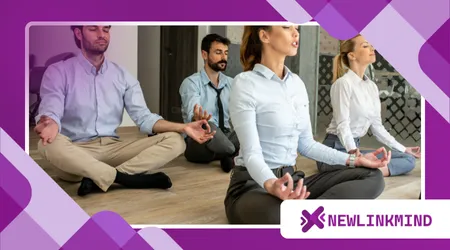Why Meditation Should Be a Daily Habit at Work

advertisements
In the fast-paced, high-pressure world of modern work, the idea that Meditation Should Be a Daily Habit at Work is more than just a passing trend—it’s a critical component of professional success and personal well-being.
We’re constantly inundated with emails, deadlines, and a relentless stream of information, making it easy to feel overwhelmed and disconnected.
Incorporating a mindful pause into your workday isn’t a luxury; it’s a strategic investment in your mental clarity, emotional resilience, and overall productivity.
Let’s explore how this simple practice can fundamentally transform your professional life.
The Science Behind a Calmer Mind at Work
Our brains are hardwired for focus, but the modern workplace often forces them into a state of constant distraction.
advertisements
Studies show this cognitive overload leads to burnout and decreased performance. When we meditate, we’re actively training our minds to return to a state of calm.
This practice strengthens neural pathways associated with focus and emotional regulation, essentially giving our brains a much-needed workout.
By consistently engaging in these short sessions, we build a mental “muscle” that can better handle stress.
advertisements
Think of your mind like a browser with too many tabs open. Each tab is a task, a worry, or a distraction, and your computer—your brain—starts to slow down.
Meditation is like closing all those unnecessary tabs, freeing up processing power and allowing you to focus on the one or two tasks that truly matter.
This mental decluttering is the first step toward a more efficient and less stressful workday.
The ability to manage these mental distractions is a skill that directly impacts your output and creativity.
Enhancing Focus and Productivity
Many professionals struggle with the “deep work” required for complex tasks.
Switching between projects, responding to notifications, and attending back-to-back meetings fragments our attention.
Meditation Should Be a Daily Habit at Work as it provides a structured way to regain control over this scattered focus.
Even a five-minute session can reset your brain, helping you transition from one task to the next with greater intention and less residual stress.
This simple act reduces task-switching costs, which are the mental hurdles we face when moving from one activity to another.
A notable 2018 study published in the journal Mindfulness found that participants who practiced mindfulness meditation for just 10 minutes a day reported significantly improved attention spans and a reduced number of mind-wandering episodes during cognitive tasks.
Read more: Can Meditation Help You Deal with a Toxic Work Environment?
This finding confirms what many meditators already know: regular practice leads to a more focused and productive mind.
When you’re not fighting a constant battle for focus, you can dedicate your full mental capacity to the challenges at hand.

Cultivating Emotional Resilience
Workplace stress is inevitable, but how we respond to it is within our control. Meditation helps us develop a non-reactive, observant stance toward our emotions.
Instead of immediately reacting to a frustrating email or a tense conversation, we can create a small space between the stimulus and our response.
Read here: How to Stay Present During a Hectic Workday
This pause allows for a more thoughtful and composed reaction. This skill is particularly valuable in leadership roles, where emotional stability is paramount.
Consider Sarah, a project manager who used to feel her heart race whenever a client demanded last-minute changes.
After integrating a five-minute meditation practice before her morning stand-up, she found she could approach these situations with a newfound sense of calm.
Instead of reacting with panic, she could assess the situation logically, leading to better problem-solving and a less stressful experience for her team.
This transformation highlights how a small shift in routine can produce significant results.
Improving Interpersonal Relationships and Collaboration
Effective collaboration is the cornerstone of a successful team. However, miscommunication and interpersonal conflicts can derail even the best projects.
When our minds are cluttered with stress, it’s difficult to listen effectively and empathize with others.
Meditation Should Be a Daily Habit at Work to foster a greater sense of presence and empathy.
A calm mind is a receptive mind, capable of truly hearing colleagues and responding with clarity rather than defensiveness.
This practice allows us to step outside our own immediate anxieties and better understand the perspectives of those around us.
For example, a marketing team struggling with creative differences might benefit from a brief guided meditation before a brainstorming session.
This simple act could help them clear their minds, listen more openly, and build on each other’s ideas without ego getting in the way. It’s an investment in the social fabric of the workplace.
The Accessible Nature of Workplace Meditation
One of the greatest misconceptions about meditation is that it requires hours of silent reflection or a spiritual guru.
In reality, it can be integrated into your workday in incredibly simple ways. You don’t need a special room or an hour of free time.
A three-minute session at your desk, a walking meditation during your lunch break, or a quick breathing exercise before a big presentation is all it takes. The key is consistency, not duration.

Here’s a simple schedule illustrating how one might weave meditation into their professional day:
| Time | Activity |
| 8:30 AM | 5-minute seated breathwork to set intentions for the day. |
| 11:00 AM | 3-minute “mindful pause” between tasks to reset. |
| 1:00 PM | 10-minute walking meditation during lunch break. |
| 3:30 PM | 5-minute gratitude meditation to combat afternoon slump. |
| 5:30 PM | 5-minute body scan to de-stress before leaving work. |
This table shows that a small, consistent effort can create a powerful routine.
By integrating these short practices, we’re not just managing stress; we’re building a more resilient, focused, and adaptable version of ourselves.
Check this out: Morning Meditation for Emotional Balance
Creating a Culture of Well-Being
When leaders and organizations champion this practice, they signal a commitment to the holistic well-being of their employees.
This commitment fosters a healthier and more supportive work environment.
The belief that Meditation Should Be a Daily Habit at Work is a mindset shift that empowers individuals to take control of their mental health.
It’s a proactive approach, moving beyond simply reacting to stress after it’s already taken hold.
The benefits extend beyond individual employees. A workforce with higher emotional intelligence, better focus, and reduced stress levels is a more innovative and collaborative workforce.
Meditation Should Be a Daily Habit at Work not just for personal gain, but for the collective success of the organization.
What if a simple five-minute practice could be the key to unlocking your team’s full potential and creating a happier, more productive workplace for everyone?
Powerful strategy
Integrating meditation into your daily professional life is a powerful, yet simple, strategy for navigating the complexities of the modern workplace.
It’s a tool for enhancing focus, building emotional resilience, and fostering more meaningful connections with colleagues.
The notion that Meditation Should Be a Daily Habit at Work is gaining momentum for a reason: it works.
By committing to this practice, you’re not just improving your performance; you’re investing in your own well-being and creating a sustainable path to professional fulfillment.
Frequently Asked Questions
How do I get started with workplace meditation if I’m a complete beginner?
Start small. Try a guided meditation app for five minutes at your desk. Focus on your breath and don’t worry if your mind wanders. The key is to be consistent.
Is it okay to meditate at my desk or do I need a quiet space?
While a quiet space is ideal, it’s not always practical. Desk meditation is a great way to start. Use noise-canceling headphones to minimize distractions.
Can meditation help with public speaking anxiety?
Absolutely. A short breathing exercise or mindfulness session before a presentation can help calm your nervous system, allowing you to speak more confidently and clearly.
